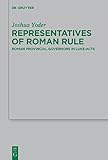Representatives of Roman Rule : Roman Provincial Governors in Luke-Acts / Joshua Yoder.
Material type: TextSeries: Beihefte zur Zeitschrift für die neutestamentliche Wissenschaft ; 209Publisher: Berlin ; Boston : De Gruyter, [2014]Copyright date: ©2014Description: 1 online resource (368 p.)Content type:
TextSeries: Beihefte zur Zeitschrift für die neutestamentliche Wissenschaft ; 209Publisher: Berlin ; Boston : De Gruyter, [2014]Copyright date: ©2014Description: 1 online resource (368 p.)Content type: - 9783110367799
- 9783110391428
- 9783110366037
- 226.4 23
- BS2589.6.R65
- online - DeGruyter
- Issued also in print.
| Item type | Current library | Call number | URL | Status | Notes | Barcode | |
|---|---|---|---|---|---|---|---|
 eBook
eBook
|
Biblioteca "Angelicum" Pont. Univ. S.Tommaso d'Aquino Nuvola online | online - DeGruyter (Browse shelf(Opens below)) | Online access | Not for loan (Accesso limitato) | Accesso per gli utenti autorizzati / Access for authorized users | (dgr)9783110366037 |
Frontmatter -- Acknowledgments -- Contents -- Abbreviations of Common Reference Works and Editions -- Introduction -- Chapter 1. Rationale and Approach -- Chapter 2. Narratives for Praise and Blame: Tacitus on Agricola, Philo on Flaccus -- Chapter 3. Governors in Historiography: Josephus’ Judean War and Judean Antiquities -- Chapter 4. An Agent of Rome in the Gospel of Luke: Pontius Pilate -- Chapter 5. Paul and Rome: The Governors in Acts -- Bibliography -- Index
restricted access online access with authorization star
http://purl.org/coar/access_right/c_16ec
Luke-Acts contains a wealth of material that is relevant to politics, and the relationship between Jesus and his followers and the Roman Empire becomes an issue at a number of points. The author's fundamental attitude toward Rome is hard to discern, however. The complexity of Luke's task as both a creative writer and a mediator of received tradition, and perhaps as well the author's own ambivalence, have left conflicting evidence in the narrative. Scholarly treatments of the issue have tended to survey in a relatively short scope a great amount of material with different degrees of relevance to the question and representing different proportions of authorial contribution and traditional material. This book attempts to make a contribution to the discussion by narrowing the focus to Luke's depiction of the Roman provincial governors in his narrative, interpreted in terms of his Greco-Roman literary context. Luke's portraits of Roman governors can be seen to invoke expectations and concerns that were common in the literary context. By these standards Luke's portrait of these Roman authority figures is relatively critical, and demonstrates his preoccupation with Rome's judgment of the Christians more than a desire to commend Roman rule.
Issued also in print.
Mode of access: Internet via World Wide Web.
In English.
Description based on online resource; title from PDF title page (publisher's Web site, viewed 28. Feb 2023)


